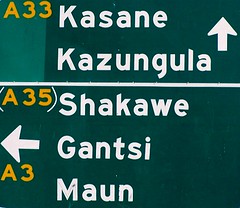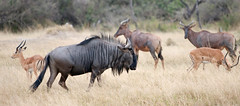So you've landed in
Botswana and you're pretty happy that the official language is English. After all, your two years of forgotten high school French have convinced you that you don't have an ear for languages. Unfortunately, you don't live in the capital. Your job is in
Gantsi, a small town of about 10,000 people and the first time someone says
O tsogile jang? to you, you realize that English isn't enough. You probably need at least a passing understanding of the
Tswana language.
Fluency Not Required
As someone who speaks French (
level B1, verging on B2) and is now working on Dutch, I can tell you that learning a new language is not easy, but it's easier when you're living there and are immersed in the language. However, here's a little secret they probably didn't tell you in your language classes: you probably don't need to be fluent. In fact, there's a good chance you don't really need to be able to form too many complete sentences. Sure, if you're working in a complex business environment where knowledge of the local language is required, you need to be able to say more than
comment-allez vous? However, if you're a lost tourist, simply saying "train station" in the native language will be enough for someone to point. Show them a map and your lack of language skills won't be much of an issue.
Top 100 Words
So how do you quickly learn enough to survive? A great way to start is to understand this article about
learning any language in three months. That's a bit optimistic, but you honestly can learn enough in three months to survive. First, focus on the top 100 words. These are the words which will make up the bulk of spoken or written material (about 50% in English). You can make flash cards to learn them or, if you're like me, use software. Of course, I wrote my own, but that's just because I'm a geek.
While mastering the top 100 words, you need to learn just the basics of grammar for the new language. Is it a familiar
SVO language where sentences are in subject-verb-object order? (e.g., "Bob reads books"), or a less common
VOS language such as Arabic? (e.g., "reads books Bob").
With a basic understanding of the grammar and memorizing the top 100 words, focus on the words you're likely to use. While traditional language classes might teach you phrases like
le singe est sur la branche, you probably want something a bit more useful like
kokelwana e ko kae? ("where is the clinic?" in Tswana).
Mistakes are OK
And don't be afraid to make mistakes! My wife's mother is learning English and while she doesn't speak it well, she has a good accent. One of the first things I ever tried to say to her in French was that I envied how good her English pronunciation was. I started by saying
j'ai envie de vous. Fortunately, I immediately realized my error: I had just made a pass at my mother-in-law. She laughed and was very understanding. We still joke about this today. People will know you're trying to speak their language and they'll appreciate the effort, even when you make mistakes.
So dive into that new language. You'll be fine. Memorize those top 100 words, learn the basics of grammar and the words covering your immediate needs and you'll be amazed at how far you can get.




Haha, this is even more true if you are trying to speak a foreign language where most of the people like trying to speak yours: they don't even bother correcting you, unless what you said was accidentally gross or something : )
ReplyDelete@Stomme: I found that very frustrating in Paris. Whenever I would speak French, people would switch to English if they heard my accent. I hear lots of people get frustrated by this in Amsterdam. It's definitely an obstacle to learning.
ReplyDeleteOddly, the Chinese always correct you. It actually makes learning Chinese a lot easier because any time you make an error, they just correct you (in Chinese). It keeps me coming back to their restaurants to keep up on my Mandarin... there's really no other means for me to do so at this point.
ReplyDeleteBeing bilingual makes it easier, when I try to speak German and people switch to English I just tell them I know no English, but I am a Spanish speaker trying to learn German. 9/10 times they are forced to listen to me in German, but that 1/10 is when due to an Erasmus year said German actually knows Spanish.
ReplyDelete